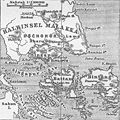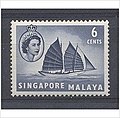Portal:Singapore
 Map of Singapore Singapore, officially the Republic of Singapore, is an island country and city-state in Southeast Asia. The country's territory comprises one main island, 63 satellite islands and islets, and one outlying islet. It is about one degree of latitude (137 kilometres or 85 miles) north of the equator, off the southern tip of the Malay Peninsula, bordering the Strait of Malacca to the west, the Singapore Strait to the south along with the Riau Islands in Indonesia, the South China Sea to the east, and the Straits of Johor along with the State of Johor in Malaysia to the north.
In its early history, Singapore was a maritime emporium known as Temasek and subsequently a major constituent part of several successive thalassocratic empires. Its contemporary era began in 1819, when Stamford Raffles established Singapore as an entrepôt trading post of the British Empire. In 1867, Singapore came under the direct control of Britain as part of the Straits Settlements. During World War II, Singapore was occupied by Japan in 1942 and returned to British control as a Crown colony following Japan's surrender in 1945. Singapore gained self-governance in 1959 and, in 1963, became part of the new federation of Malaysia, alongside Malaya, North Borneo, and Sarawak. Ideological differences led to Singapore's expulsion from the federation two years later; Singapore became an independent sovereign country in 1965. After early years of turbulence and despite lacking natural resources and a hinterland, the nation rapidly developed to become one of the Four Asian Tigers. As a highly developed country, it has one of the highest PPP-adjusted GDP per capita. It is also identified as a tax haven. Singapore is the only country in Asia with a AAA sovereign credit rating from all major rating agencies. It is a major aviation, financial, and maritime shipping hub and has consistently been ranked as one of the most expensive cities to live in for expatriates and foreign workers. Singapore ranks highly in key social indicators: education, healthcare, quality of life, personal safety, infrastructure, and housing, with a home-ownership rate of 88 percent. Singaporeans enjoy one of the longest life expectancies, fastest Internet connection speeds, lowest infant mortality rates, and lowest levels of corruption in the world. It has the third highest population density of any country, although there are numerous green and recreational spaces as a result of urban planning. With a multicultural population and in recognition of the cultural identities of the major ethnic groups within the nation, Singapore has four official languages: English, Malay, Mandarin, and Tamil. English is the common language, with exclusive use in numerous public services. Multi-racialism is enshrined in the constitution and continues to shape national policies. Singapore is a parliamentary republic and its legal system is based on common law. While the country is de jure a multi-party democracy with free elections, the government under the People's Action Party (PAP) wields widespread control and political dominance. One of the five founding members of ASEAN, Singapore is also the headquarters of the Asia-Pacific Economic Cooperation Secretariat, the Pacific Economic Cooperation Council Secretariat, and is the host city of many international conferences and events. Singapore is also a member of the United Nations, the World Trade Organization, the East Asia Summit, the Non-Aligned Movement, and the Commonwealth of Nations. (Full article...)Selected article - The flag of Singapore was adopted in 1959, the year Singapore became self-governing within the British Empire. It remained the national flag upon the country's independence from Malaysia on 9 August 1965. The design is a horizontal bicolour of red above white, overlaid in the canton (upper-left quadrant) by a white crescent moon facing a pentagon of five small white five-pointed stars. The elements of the flag denote a young nation on the ascendant, universal brotherhood and equality, and national ideals. Vessels at sea do not use the national flag as an ensign. Merchant vessels and pleasure craft fly a civil ensign of red charged in white with a variant of the crescent and stars emblem in the centre. Non-military government vessels such as coast guard ships fly a state ensign of blue with the national flag in the canton, charged with an eight-pointed red and white compass rose in the lower fly. Naval ships patrol a naval ensign similar to the state ensign, but in white with a red compass rose emblem. (Full article...) Selected picture The Jurong BirdPark (Chinese: 裕廊飞禽公园; Malay: Taman Burung Jurong), is a tourist attraction in Singapore managed by Widlife Reserves Singapore. It is a landscaped park, built on the western slope of Jurong Hill. It is located within the Boon Lay Planning Area of the Jurong district and has an area of 202,000 square metres. Read more... General imagesThe following are images from various Singapore-related articles on Wikipedia.
Selected biography -Tao Li (Chinese: 陶李; pinyin: Táo Lǐ; born 10 January 1990) is a Chinese-born Singaporean competitive swimmer who specializes in the backstroke and butterfly. Tao has represented Singapore at the Southeast Asian Games (SEA Games), the Asian Games, World Championship, Commonwealth Games and Olympics. She holds several national records and is the only female Singapore swimmer who qualified for an Olympic Final. (Full article...) Did you know (auto-generated)
In this month
More did you know -
Selected panoramaThe Asian Civilisations Museum (ACM, Chinese: 亚洲文明博物馆) is an institution which forms a part of the three museums of the National Museums of Singapore. It is one of the pioneering museums in the region to specialise in pan-Asian cultures and civilisations. Singapore topicsRelated portalsSoutheast Asia Other Countries Tasks
CategoriesWikiprojectsAssociated WikimediaThe following Wikimedia Foundation sister projects provide more on this subject:
Discover Wikipedia using portals |






























































